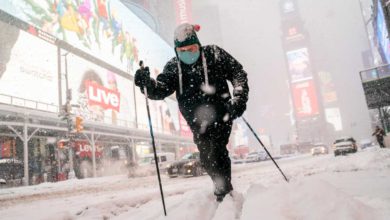People of color and other marginalized, low-income people will be most affected by an overturning of landmark abortion case Roe v. Wade, health and policy experts said after a leaked Supreme Court draft opinion was published by Politico Monday.
In the draft opinion, Associate Justice Samuel Alito wrote, "We hold that Roe and Casey must be overruled." He said Roe was “egregiously wrong from the start,” and called its reasoning “weak.”
About half of U.S. states, concentrated in the South, Midwest and Plains, have restrictive abortion laws set to go into effect should the reversal take place. Experts say those who disproportionately have trouble accessing health care, often people of color, will be most impacted.
More than half of the nation’s Black population lives in the South, where women of color, including Hispanic women, make up a significant proportion. The Plains states also have a large Indigenous population. Days ago, the Oklahoma Legislature passed a six-week abortion ban similar to one adopted by Texas last year.
WHERE THE STATES STAND: If Roe v. Wade is overturned, here's how abortion laws in each state will stand
“We know that it's going to impact those who already have barriers to health care, even before an abortion ban,” said women's health and reproductive rights policy expert Fatima Goss Graves, an attorney and president of the National Women’s Law Center. “Those who live in rural areas, women of color, those who have low income.”

If Roe is overturned, people may travel hundreds of miles to get to states where abortions are still allowed. Young and low-income people, who are disproportionately of color, may not be able to afford the cost of travel.
“This will be a giant and larger hurdle placed in front of them,” Graves said. “Most people who seek abortion care already have children. And they may not have time off work, access to child care, the things they need to be able … to leave their community to get constitutionally protected health care.”
Center for American Progress attorney and women’s health policy analyst Elyssa Spitzer noted women of color and LGBTQ people already experience bias and discrimination in health care.
“It is very concerning, and very alarming and would devastate access for many millions of women in the United States,” she said. Subjecting women to carry an unintended pregnancy to term "is immensely painful, and arduous and a violation of human rights.”
LEAKED DRAFT:Explosive leaked draft in abortion case reveals Supreme Court on verge of overturning Roe
STATES POISED TO BAN:26 states plan to ban abortion in some form if the Supreme Court OKs Mississippi's ban.
Citing the Turnaway Study, which found significant harms after abortion denials, Spitzer said carrying a pregnancy to term also can pose financial barriers and well-being.
“It makes it much more difficult for women to escape poverty, for women to pursue the careers that they want, it imposes a change on a family structure that women might not want to undertake,” she said.
Those hurdles include increased chances of economic hardship and insecurity following birth, staying with a violent partner or raising a child alone, and threats to the well-being and development of children already in the home, the study found.
Lead study author Diana Greene Foster, a professor at the University of California, San Francisco, Bixby Center for Global Reproductive Health, said, “Abortion is an issue which disproportionately affects people of color,” subjecting them to “totally underappreciated risks of pregnancy.”
A study estimating the effects of an abortion ban on maternal death by the University of Colorado, Boulder, found that among Black women, maternal deaths could increase by one-third. Black women are already three times more likely to die of pregnancy-related causes than white women.

The Society for Maternal-Fetal Medicine’s Dr. Cynthia Gyamfi-Bannerman, a specialist in maternal-fetal medicine and high-risk pregnancies, said racial disparities in pregnancy outcomes are exacerbated by restrictions to reproductive rights.
“It creates a bias in who is able to get care and who cannot get care,” she said. “There are some medical conditions in which a pregnancy is very, very dangerous to the mother."
A VICTORY FOR ANTI-ABORTION GROUPS: They aren't stopping there.
More than 80% of callers to Access Reproductive Care-Southeast, which offers financial and logistical support to abortion seekers in the region, were Black, uninsured or on public insurance, and about 77% had one child already, according to a joint study last year by the organization and Emory University. The study analyzed characteristics of 10,000 callers from Florida, Alabama, Georgia, South Carolina, Tennessee and Mississippi.
“We must acknowledge that Roe never guaranteed that abortion would be accessible, because for so many people that we work with, the ability to access abortion care has already been pushed out of reach for decades," ARC co-founder and executive director Oriaku Nijoku, who co-authored the study, said at a media briefing Tuesday. This is our daily lived reality."

Dr. Bhavik Kumar, medical director at Planned Parenthood Gulf Coast, is a physician and abortion provider in Texas, where a restrictive abortion law was passed last year, and a total ban is set to go into effect if Roe is overturned.
“Though I’m trying to assist many patients as possible, I’m still stunned that I’ve been asked to turned my back on the health and well-being of my patients,” Kumar said during a debriefing with Njoku and others. “As a family medicine physician, I see this firsthand in my patients’ stories and lived experiences.”
Supreme Court opinion drafts are subject to change, and are part of the high court's deliberative process. But analysts have maintained since oral arguments last year that it appeared likely the high court would overturn Roe. the landmark 1973 decision. A decision is expected this summer.
Reach Nada Hassanein at [email protected] or on Twitter @nhassanein_.








